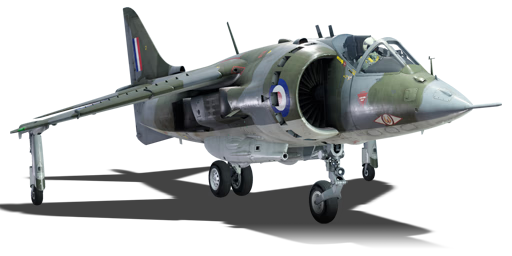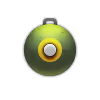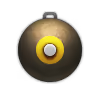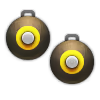



The Harrier GR.1 was developed from the Hawker-Siddeley P.1127 and the Hawker-Siddeley Kestrel FGA.1 prototype aircraft that demonstrated the feasibility of using vectored thrust to achieve V/STOL capability. Recognizing the potential of this technology to operate from unprepared sites and evade enemy air defenses, the Royal Air Force (RAF) adopted it for their use. In 1969, the Harrier GR.1 was officially introduced into service. It was primarily designed for ground-attack and reconnaissance missions, capitalizing on its unique ability to take off and land in a variety of environments. This flexibility made it a valuable asset in the RAF's arsenal. Beyond its primary roles, the Harrier GR.1 was also tested with Short Range Air-to-Air Missiles (SRAAMs), a British project that spanned from 1968 to 1980. These infrared homing missiles were capable of executing high-G turns, making them ideal for close-range dogfights. It paved the way for future advancements in aircraft design and missile technology, setting the stage for the next generation of combat aircraft and air-to-air missiles.
The Harrier GR.1 was introduced in Update "New Power". Like all members of the Harrier family, the Harrier GR.1 is a VTOL aircraft with thrust vectoring nozzles, which allow it to take off and land vertically. The Harrier GR.1 can be equipped with a variety of ordnance, including SRAAMs, bombs, and rockets. It excels at low-altitude combat, where it can use its VTOL capabilities to surprise enemies and evade attacks. However, it also has low top speed and agility, making it easy prey for faster and more manoeuvrable enemies. Additionally, it lacks any kind of countermeasures, such as chaff or flares, leaving it vulnerable to enemy missile attacks. On the bright side, the aircraft can use its SRAAMs to intercept incoming missiles head-on. It is a challenging but rewarding aircraft to master, offering a unique gameplay experience and a versatile loadout.
flaps
flaps
flaps
brake
| Belt | Belt filling | Armor penetration (mm) at a distance: | |||||
|---|---|---|---|---|---|---|---|
| 10 m | 100 m | 500 m | 1000 m | 1500 m | 2000 m | ||
| AP/HEI-T | 37 | 34 | 22 | 13 | 8 | 5 | |
| AP/HEI-T/AP | 37 | 34 | 22 | 13 | 8 | 5 | |
| HEF-I/HEI-T | 4 | 4 | 4 | 4 | 4 | 4 | |
| AP/HEF-I | 37 | 34 | 22 | 13 | 8 | 5 | |
| Name | Weight | Slot | ||||
|---|---|---|---|---|---|---|
| 2 × | 140 kg |  |  | |||
| 18 × | 183.9 kg |  |  | |||
| 213.1 kg |  |  |  |  |  | |
| 235.9 kg |  |  |  |  |  | |
| 36 × | 367.8 kg |  |  | |||
| 2 × | 426.2 kg |  |  | |||
| 486 kg |  |  |  | |||
| 2 × | 972 kg |  |  | |||
| 486 kg |  |  |  | |||
| 2 × | 972 kg |  |  | |||







 2 x (95 / 315 / 600) %
2 x (95 / 315 / 600) % 
 2 x 226 %
2 x 226 % 

Flight performance | |
|---|---|
Survivability |
|---|
Weaponry | ||
|---|---|---|